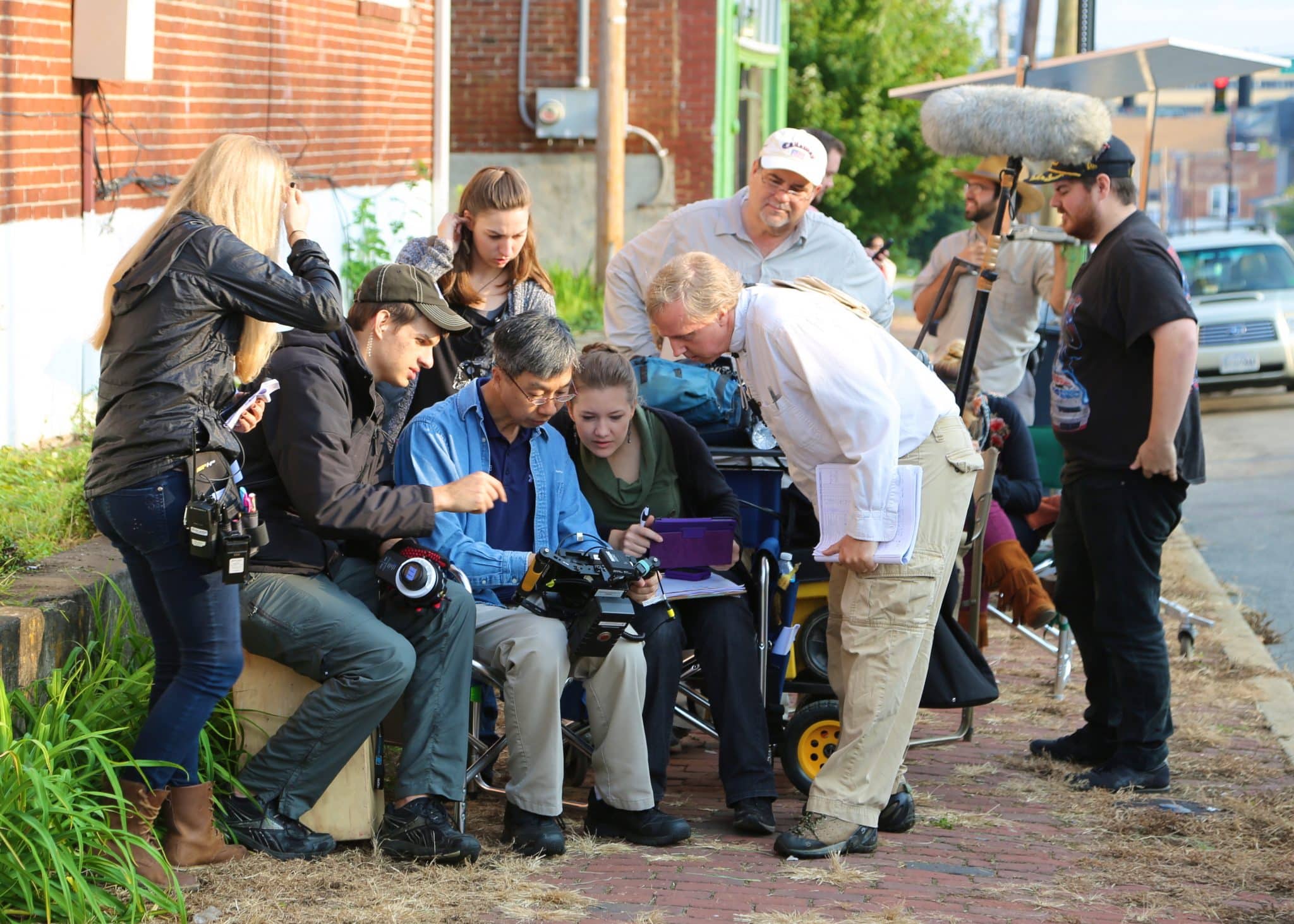7 things we learnt about the state of religion in Singapore from the IPS study
by Edric Sng // March 29, 2019, 12:01 pm

An aerial view of St Andrew's Cathedral. Photo: Victor Garcia/Unsplash
The Institute of Policy Studies released its study on Religion in Singapore: The Private and Public Spheres, on Wednesday, March 29.
Mediacorp newsrooms zoomed in on concerns related to religious extremism: “Almost a quarter of Singaporeans would allow religious extremists to post views online” (Channel NewsAsia); “Nearly 1 in 2 young Singaporeans open to extremist views being posted online” (TODAY).
The Straits Times jumped on the angle of the perceived frustration when religion influences politics, with the headline saying it all: “Most Singaporeans frown on religious influence on politics, but a sizeable number open to extremists sharing their views”.
Beyond those headlines, there is much to glean from a methodologically and statistically robust survey of Singaporeans on their views on religions. Here’s what we learnt:
1. SINGAPORE IS STILL VERY MUCH A RELIGIOUS NATION

Religion is still very much relevant in Singapore today. Only 14% disagreed with the statement that “Religion is as relevant to life today as in the past”.
“The study found high levels of religiosity among Singaporeans. About three in four Singaporeans said they followed a religion. The majority of respondents were likely to believe in religious concepts such as heaven, hell, life after death and religious miracles,” researchers Mathew Mathews, Leonard Lim and Shanthini Selvarajan of the IPS wrote in their introductory abstract.
“Even among those who professed no religion, there were substantial numbers who believed in some religious concepts or supernatural powers.”

Almost two-thirds of respondents (65.6%) identified themselves as being extremely, very or somewhat religious, with “neutrals” at 18.0% outnumbering those who identified as non-religious. Even among those with no religion, 27% identified themselves as “spiritual” even if they did not follow a religion.

Only 7.6% said they outright “do not believe in God”. More than half, 53.2% say they have no doubts about the existence of God.
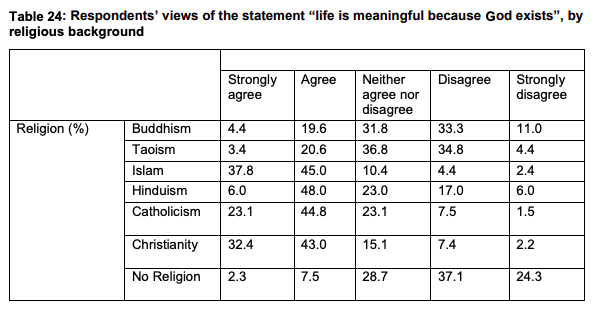
Not only do the majority of Singaporeans acknowledge that a God exists, many find knowing God is central to their existence. 42.9% say that life is only meaningful because God exists, compared to 32.3% who disagree with the statement.
Around four in 10 respondents (42.4%) reported that they pray either daily, or several times a day. Only 17.4 per cent report never praying. Muslim respondents (77%) were the most likely to pray at least once a day.
Almost 7 in 10 – 69.8% – believe in religious miracles.
However, a concession was made that this adherence to religiosity decreased among younger and higher educated respondents. See Point 2.
2. AGE AND EDUCATION AFFECT RELIGIOUS VIEWS
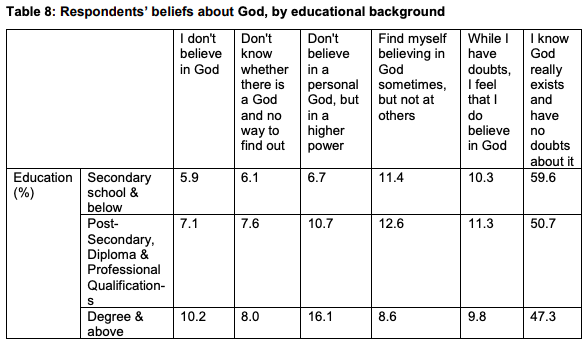
Three-fifths (59.6%) of those with a secondary school and below education say they know without a doubt that God exists, compared to under half (47%) of respondents with a bachelor’s degree and above. This educational discrepancy was particularly pronounced among Hindus, Buddhists and Taoists, according to the survey.
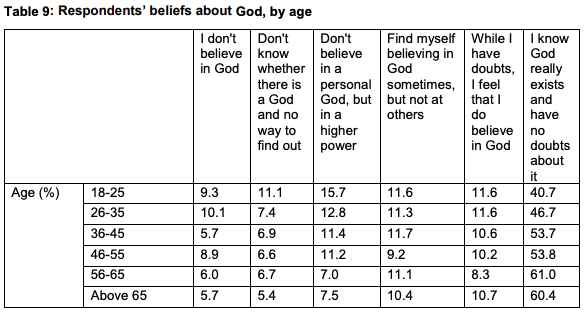
Similarly, while 60.4% of those aged above 65 indicated they know that God exists, this dipped to around 40% for those aged between 18 and 25. However, among Muslims and Christians, age was not a factor – the survey found that young Muslims and Christians were as likely to be steadfast as older Muslims and Christians.
Around 90% of Muslims aged 18-25 indicated they have no doubts that God really exists, compared to 88.2 per cent of Muslims above 65. A similar ratio was seen among Christians, where around 85% of those aged 18-25, compared to 87% of those above 65, felt the same.
An area of interest is the difference age makes towards openness of airing extreme religious views.
About a quarter (26.8 per cent) of respondents were open to religious extremists publishing their views on the internet or social media. But taken in isolation, younger respondents were much more open to this, with nearly 46 per cent of those between 18 to 25 years indicating that they would allow for publication such extremist views that considered all other religions as enemies.
Educational qualifications also impact prayer life. Around half (49.9%) of respondents with a secondary school and below level of education indicated they prayed at least once a day, compared to 34.5 per cent of respondents with at least a bachelor’s degree.
3. MOST SINGAPOREANS BELIEVE IN THE EXISTENCE OF HEAVEN AND HELL
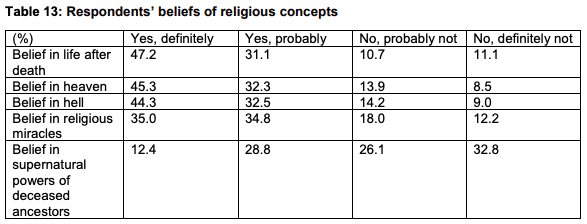
A large majority of respondents (78.3%) say there is “definitely” or “probably” life after death. A similar proportion believe there is a heaven (77.6%) and a hell (76.8%). A significant proportion, 41.2% believe that dead ancestors have supernatural powers.
The majority of respondents across religious backgrounds at least “probably” believed in life after death, while Muslims, Christians and Catholics were the most likely to be “definitely” sure of life after death.
4. DISCOVERING FAITH LATER IN LIFE OFTEN LEADS TO STRONGER PRACTICE OF FAITH
“There was increased piety (as reflected in frequency of prayer) among those who reported having a turning point in their lives where they made a commitment to religion,” wrote researchers.
The majority of respondents did not have such a “turning point”, with 68.1% indicated they had never experienced a point in their lives where they made a new and personal commitment to religion. But among the religions, Christian respondents (76.1%) were found to be most likely to have undergone such a renewed commitment.
In general, those who reported such a turning point were more likely to demonstrate higher levels of religious practice. Almost two-thirds (64%) of respondents who had such a renewal said they pray at least once a day, as compared to 32.3% of those who did not report a turning point. This was true for all religions.
5. YOUR FAITH LIKELY INFORMS YOUR MORAL CODE
“There was some relationship between religious affiliation and respondents’ attitudes towards some moral issues,” noted the researchers.
For example, respondents were divided when asked about the hypothetical emergence of a law that contradicts their religious principles. About half – 48 per cent – would follow the law while 35.6 per cent of them would follow their religious principles.
Which side they would lean towards also depended on which religion respondents belonged to. The most likely to follow their religious principles over the law if they were to contradict were Christians (67.6 per cent), Catholics (61.6 per cent) and Muslims (66.3 per cent).
Most respondents (81.9%) agreed that religious leaders should not try to influence how people vote. However, a sizeable proportion of Christians (44.5%) and Catholics (41.2%) said it was “acceptable” or “very acceptable” for a religious leader to speak up against potential changes to existing laws that go against what their religion teaches is correct. Less than one in five of those from other religions said such conduct was acceptable.
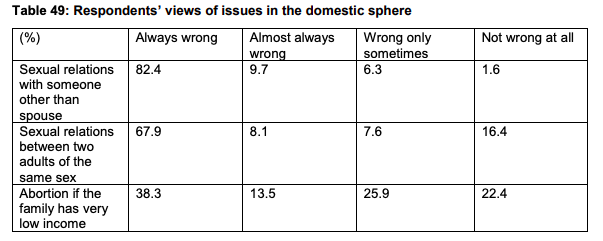
Views on adultery across all religions were strongly against extramarital sexual relations (92.1% said it was “always wrong” or “almost always wrong”).

Respondents also spoke against sexual relations between adults of the same sex (76% saying it is always or almost always wrong) – with even the majority (59.5%) of those professing “no religion” saying it is wrong. Across religions, educational levels and age, the most accepting demographic of sexual relations between adults of the same sex was those aged 18-25, where 40.8% said it is “not wrong at all”.
6. SUPERSTITIOUS BELIEFS ARE IN THE MINORITY
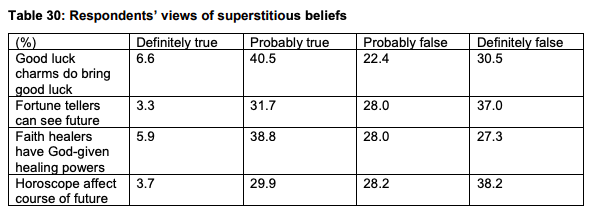
Less than half of respondents believe that:
- Good luck charms bring good luck (47.1% true vs 52.9% false)
- Fortune tellers can see the future (35% true vs 65% false)
- Faith healers have God-given powers (44.7% true vs 55.3% false)
- Horoscopes can affect the future (33.6% true vs 66.4% false)
Christians were most likely to believe that faith healers have God-given healing powers. Nearly 6 in 10 Christians “definitely” or “probably” believed in this, while Muslim respondents were the least likely to believe in faith healers.
7. RELIGIOUS SINGAPOREANS STILL TRUST THEIR RELIGIOUS BODIES
The majority of respondents expressed they had “complete” confidence, “a great deal of confidence”, or were “somewhat confident” in religious organisations, according to the survey, with only 8.8% saying they had very little to no confidence.
Even 81.6% of those with no religion expressed a similar level of confidence in Singapore’s religious organisations.
The survey involved face-to-face interviews with a random but representative sample of 1,800 adult Singaporean Citizens or PRs, on issues relating to religious beliefs, religiosity and the role of religion in the private and public sphere. Download the full report here.
We are an independent, non-profit organisation that relies on the generosity of our readers, such as yourself, to continue serving the kingdom. Every dollar donated goes directly back into our editorial coverage.
Would you consider partnering with us in our kingdom work by supporting us financially, either as a one-off donation, or a recurring pledge?
Support Salt&Light
